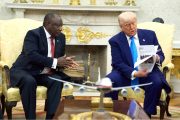After 16 months of conspiracy theories directed against the Egyptian military predicting that the “democratic process” would be subverted to keep allies of former President Hosni Mubarak in power, the commission overseeing that nation’s presidential election has declared Muslim Brotherhood candidate Mohamed Morsi the victor.
A surprisingly-low turnout in the runoff June 16–17 election between Morsi and former prime minister Ahmed Shafik was followed by a narrow margin of victory for the Islamist candidate. According to the Associated Press, Morsi won with 51.7 percent of the vote — a margin of victory of only 800,000 votes.
In the weeks leading up to the election, the Egyptian parliament had attempted to force Shafik out of the race by passing a law that would have banned candidates associated with the Mubarak regime from running for office. Egypt’s Supreme Constitutional Court threw out the law, and also determined that a third of the members of parliament had secured their offices in violation of the nation’s election laws. Removing a third of the parliament effectively dissolved that body, and led to a constitutional crisis on the eve of the election.
When word of Morsi’s electoral victory was released on June 25, the president-elect was quick to give his acceptance speech. The AP reported that he delivered his speech “stiffly as he read from notes,” declaring: “I tell everybody in this memorable day, that because of your choice, your will, and after God’s favor, I am a president for all Egyptians.”
Morsi became the Muslim Brotherhood’s presidential candidate when the elections commission removed the party’s previous choice — Khairat Shater — from consideration because of his Mubarak-era record of convictions for money laundering and terrorism.
In February 2011, a leader of the Muslim Brotherhood, Muhammad Ghannem, reportedly called for the closing of the Suez Canal and declared that the people of Egypt “should be prepared for war against Israel.” Now that the Brotherhood has taken control of the presidency, a more modest approach toward Israel is being advocated. Morsi’s speech seemed to offer a degree of assurance that he would not immediately nullify the peace treaty that has existed between Egypt and Israel since a the treaty was signed between the two nations in 1979.
According to the AP report, “Speaking on Egyptian television Sunday evening, Morsi declared he had a ‘message of peace. We will respect all international agreements.’ He did not mention Israel but the remark seemed to be a reassuring nod to respecting the peace treaty.” The nebulous message of peace was greeted with similarly cautious remarks from Tel Aviv: “The reaction from Israel was subdued, with Prime Minister Benjamin Netanyahu saying he respected the results of Egypt’s democratic process and hoped the peace agreement between the two countries would remain intact. Ecstatic residents in the Hamas-ruled Gaza Strip filled the streets, fired guns in the air and handed out candy.”
The Muslim Brotherhood has often raised fears that the military would somehow subvert the elections. Now that Morsi has been elected — the latest in a series of events in which the military stood by as candidates and political parties noted for their hostility to Egypt’s armed forces gained power — the chimerical character of the military threat becomes increasingly apparent. A story from Reuters cited one official close to the transitional military authority:
“The military council has done its duty in keeping the election process free and fair, a true example of democracy, to the world,” said the official, who asked not to be named.
“The onus now is on the new president to unite the nation and create a true coalition of political and revolutionary forces to rebuild the country economically and politically.”
The transition from the military-backed governments of Anwar Sadat and Hosni Mubarak to governance by a once-banned Islamist organization has been, in a sense, surprisingly smooth. The military council has mostly ignored the strident rhetoric of various competing Islamists and has remained committed to surrendering power to an elected civilian government. Still, transferring power to a organization which was, in the words of the New York Times, a “secret society” (that is, the Muslim Brotherhood), has been hampered by the rumor mongering of the Islamists. While the elections commission investigated 400 allegations of vote tampering, the Muslim Brotherhood generated a rumor (which was then adopted by various Western news agencies) that the military was preparing to steal the elections. Again, as the New York Times declared:
For much of Sunday, the capital was tense with apprehension that the panel of Mubarak-appointed judges overseeing the election might annul the ballot count and declare Mr. Shafik the president, completing a full military coup. Banks, schools and government offices closed early for fear of violence.
Tens of thousands of Brotherhood supporters and their allies against military rule gathered in Tahrir Square for the sixth day of a sit-in, demanding that the military roll back its power grab. Around 3:30 p.m., hushed crowds gathered around portable radios to hear the election commissioner’s rambling introduction of the official result.
Then they leapt to their feet: Mr. Morsi had won 51.7 percent of the runoff votes.
“Morsi, Morsi!,” the crowd chanted. “Down, down with military rule!”
Smiling riot police officers put down their helmets to exchange congratulations with bearded protesters.
Given the massing of tens of thousands of protesters in the Tahrir Square, the military council was quick to transfer power; far from executing a “power grab,” the governing authorities seemed almost in a rush to transfer that governance into the hands of a once-“secret society” that has established a track record of threatening mob violence every time its whims are not rewarded.
As reported previously for The New American, credible reports have circulated that indicate that the Muslim Brotherhood is preparing to export its revolution to neighboring nations. Both Kuwait and the United Arab Emirates may pay the price for the decision in Washington to support the Islamist victory in Egypt. With the Obama administration quickly congratulating the new Egyptian president, it remains to be seen what the reign of President Morsi bodes for his nation and the region.
Photo of Mohamed Morsi: AP Images




